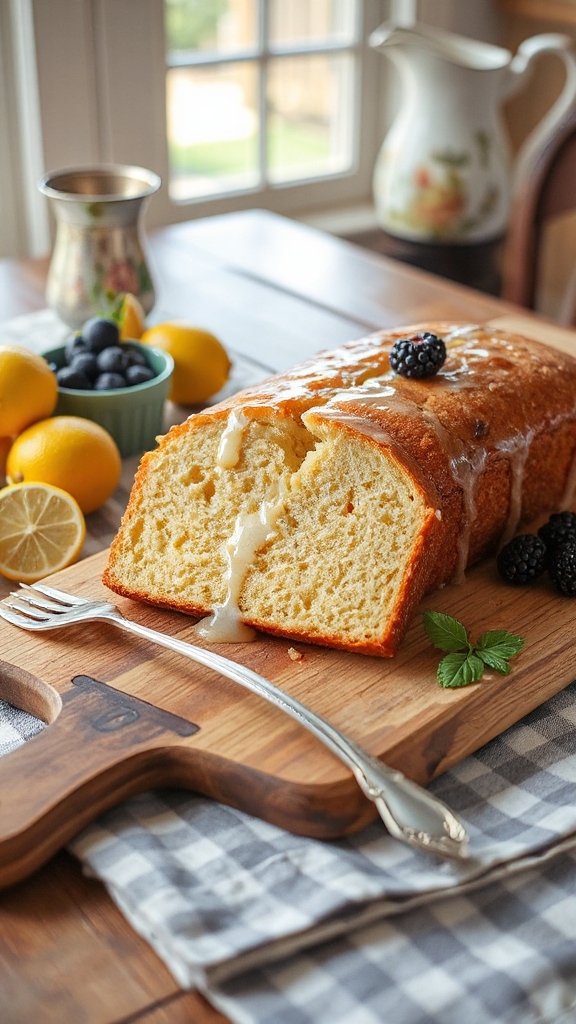Lemon Pound Cake – North Carolina: Lemon, Pound Cake, Moist
Savor the zesty, moist secrets of North Carolina's lemon pound cake—discover regional twists that will transform your baking.

Lemon Pound Cake in North Carolina showcases fresh lemon zest and juice, delivering a vibrant citrus flavor and essential moisture for a tender crumb. Bakers achieve this by creaming butter with sugar, folding in lemon elements, and baking at precise temperatures to prevent dryness. Regional twists, like local berries, add a Southern flair. Explore these insights further for baking tips and creative variations.
Key Lemon Components
In Lemon Pound Cake, the key lemon components—zest, juice, and extract—play pivotal roles in elevating the dessert’s flavor. From a botanical perspective, lemons derive from the Citrus limon tree, where zest captures aromatic oils from the peel, juice offers tangy acidity from the pulp, and extract concentrates essence for depth. These elements not only enhance taste but also provide nutritional values like vitamin C and antioxidants.
- Botanical Aspects: Zest embodies the fruit’s outer rind, rich in essential oils for fragrance.
- Nutritional Values: Juice delivers high vitamin C, boosting immunity and aiding digestion.
- Botanical Aspects: Extract stems from the fruit’s volatile compounds, amplifying citrus notes.
- Nutritional Values: Overall, these components offer flavonoids, promoting heart health in moderation.
Detailed Moist Baking Steps
Achieving a moist texture in Lemon Pound Cake requires careful execution of baking steps that build on the lemon components’ contributions. Effective Baking Techniques preserve the cake’s inherent moisture while enhancing flavor. These methods guarantee a tender crumb without over-baking.
- Preheat and prepare: Set the oven to 325°F and grease the pan to promote even heat distribution, preventing dryness.
- Mix precisely: Cream butter and sugar thoroughly, then fold in lemon zest and juice to lock in moisture through emulsion.
- Bake thoughtfully: Monitor temperature and time, using a toothpick test to avoid overcooking, which maintains the cake’s softness.
- Storage Tips: Cool completely before wrapping in plastic and refrigerating to retain moistness for up to a week.
Lemon Tea Pairings
Pairing lemon tea with Lemon Pound Cake creates an invigorating synergy that amplifies the dessert’s citrus essence. This harmonious duo elevates flavors through exotic pairings and wellness blends, offering a revitalizing contrast to the cake’s moist texture.
- Explore exotic pairings: Combine lemon tea with hibiscus for a tart, floral twist that intensifies the cake’s zesty notes.
- Incorporate wellness blends: Opt for ginger-infused lemon tea to add soothing, anti-inflammatory benefits alongside the dessert’s richness.
- Enhance with herbal elements: Blend in mint for a cooling effect that balances the cake’s sweetness and promotes digestion.
- Experiment with variations: Try lavender wellness blends to create a calming pairing that subtly complements the lemon’s vibrancy.
North Carolina Twists
North Carolina’s regional flavors reimagine Lemon Pound Cake through inventive twists, blending local blueberries and pecans with the classic citrus base for a fresh, Southern-inspired variation. Drawing from Coastal History, the cake echoes early maritime influences with tart, sea-inspired notes, while Appalachian Folklore adds earthy storytelling through nutty textures. This fusion creates a moist, evocative treat.
- Blueberry Infusion: Fresh coastal berries enhance moisture, reflecting North Carolina’s seaside heritage.
- Pecan Crunch: Appalachian nuts provide a folklore-rooted contrast, evoking mountain tales.
- Citrus Harmony: Balances acidity with local flavors for a Southern twist.
- Moist Texture: Achieved through regional ingredients, ensuring a tender, memorable bite.
Southern Lemon Variations
Southern lemon variations of the classic pound cake infuse it with diverse regional elements, such as bourbon glazes or peach accents, creating a harmonious blend that captures the South’s rich culinary heritage while preserving the zesty core. These adaptations showcase cultural influences and seasonal uses, blending traditions with local flavors for an engaging twist.
- Cultural Influences: Southern history infuses cakes with bourbon or pecans, reflecting community storytelling and heritage celebrations.
- Seasonal Uses: Perfect for spring picnics or summer barbecues, these variations highlight fresh lemons during peak harvest.
- Regional Flavors: Incorporating Georgia peaches or Louisiana spices adds a vibrant, layered taste profile.
- Heritage Blends: They maintain moist textures while evolving recipes to honor familial customs.
Lemon Cake Fixes
Beyond the flavorful adaptations of regional lemon cakes, practical fixes address common baking challenges, such as overly dense textures or uneven rising, equipping home bakers with straightforward techniques to refine recipes and achieve flawless results. Home bakers encounter issues like dietary restrictions and storage woes, which can be resolved effectively. Here are key strategies:
- Dietary Fixes: Swap all-purpose flour for gluten-free alternatives to accommodate sensitivities while preserving moisture and flavor.
- Texture Improvements: Incorporate additional baking powder to lighten dense cakes, ensuring a tender crumb without altering taste.
- Storage Solutions: Wrap cooled cakes in plastic and refrigerate to retain moistness for up to a week, preventing staleness.
- Rising Enhancements: Preheat the oven accurately and use even pans to promote uniform lift and avoid cracks.
Conclusion
In concluding this exploration of lemon pound cake, its timeless appeal lies in the harmonious blend of zesty flavors and adaptable techniques, empowering bakers to create a consistently delightful dessert that balances tradition with innovation. Final Thoughts emphasize the cake’s moist texture and North Carolina roots, where simple fixes enhance its zesty essence. The Blog Summary recaps key elements: ingredient selection, precise mixing, and baking strategies that yield flawless results, inspiring home cooks to innovate while honoring classics, ensuring lemon pound cake remains a versatile, enduring favorite in any kitchen.
Frequently Asked Questions
How Long Does Lemon Pound Cake Last?
The shelf life of lemon pound cake typically spans 3-5 days at room temperature, a key consideration for its longevity. Freshness tips, such as storing in an airtight container and refrigerating, help maintain its moist, flavorful essence for extended enjoyment.
Can I Freeze Lemon Pound Cake?
The theory that freezing preserves baked goods’ quality is worth examining, as lemon pound cake can indeed be frozen using effective freezing techniques like airtight wrapping. Thawing methods, such as gradual refrigeration, maintain its texture and moisture.
How Many Calories in One Slice?
The query regarding calories in one slice prompts consideration of calorie estimation and nutritional impact. A typical slice of lemon pound cake estimates 250-350 calories, depending on ingredients, potentially affecting daily intake and health-conscious decisions.
Is This Recipe Gluten-Free?
Like a silent gatekeeper to dietary freedom, the question of a recipe’s gluten-free status beckons exploration of gluten alternatives and allergen options. Typically, standard recipes contain gluten, but modifications using substitutes can create safer, inclusive versions.
What Equipment Is Needed?
The question of what equipment is needed involves exploring Equipment Variations and Utensil Alternatives for efficient baking. Essential items include mixers, ovens, measuring cups, and pans, with substitutions like hand whisks for electric ones enhancing accessibility and creativity.

Hi There! I'm Stephanie Miller: Elementary teacher from Columbus, OH sharing grandma's treasured American recipes! 50 years young, yoga enthusiast & kitchen storyteller. Welcome to my food family! 🍰❤️














